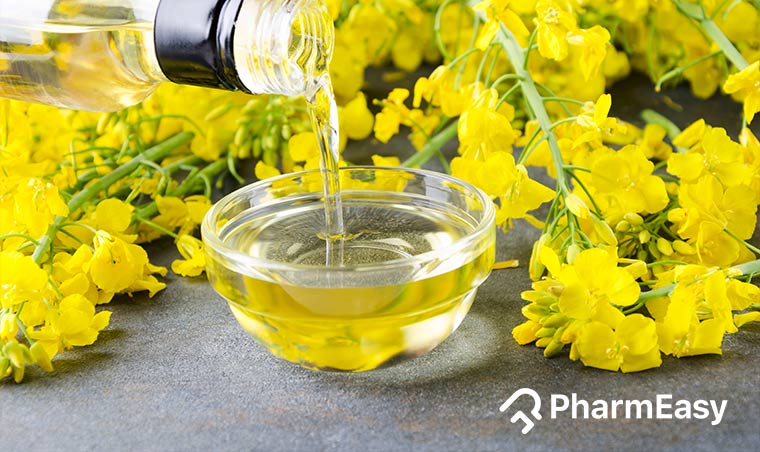Canola Oil: Uses, Benefits, Side Effects by Dr. Smita Barode
By Dr Smita Barode +2 more

Get,

to manage your symptom
Get your,


4 Cr+ families
benefitted

OTP sent to 9988776655



You’ve successfully subscribed to receive
doctor-approved tips on
Whatsapp

Get ready to feel your best.

Hi There,
Download the PharmEasy App now!!


Register to Avail the Offer
Send OTPBy continuing, you agree with our Privacy Policy and Terms and Conditions

Hi There,
Sign up on PharmEasy now!!
Trusted by 4 crore+ families

OTP sent to 9988776655



You have unlocked 25% off on medicines




Code: NU25

Comments


Leave your comment here
By Dr Smita Barode +2 more
Table of Contents
Canola is a yellow flowering plant that belongs to the family Brassicaceae. Three different species in this family are Brassica rapa, Brassica napus and Brassica juncea. B.napus, also known as rapeseed, was identified in 2000 B.C. originally in Northern Europe and the Mediterranean. Rapeseed is a crop high in erucic acid. It is known to contain >40% erucic acid (monounsaturated omega-9 fatty acid). Animal studies showed erucic acid was unhealthy for human use and used in small quantities for industrial use in North America.
In 1976, Canadian scientists were able to improve the quality of rapeseed. In 1979, Canada registered the word “canola” for the discovery of a new seed found to produce oil, which was low in erucic acid and glucosinolates. Canola oil has now become has become one of the major oilseed crops worldwide. After palm and soyabean oil, canola oil production ranks third largest vegetable oil by volume. Let us find more exciting benefits regarding canola oil1.

Canola oil contains no traces of cholesterol and is made up of unsaturated fats, this is the reason why it is considered healthier compared to other oils. The percent composition of canola oil is given below
Scientific literature has found that the consumption of canola oil shows numerous properties as mentioned below:
Let me share something really interesting about canola oil. It contains vitamin E, including gamma-tocopherol and alpha-tocopherol. Vitamin E might play an important role in keeping your cell membranes healthy, especially those in your mucus membranes and skin. It does so by acting as a potential shield against harmful oxygen-free radicals that might damage your cells8.
Dr. Rajeev Singh, BAMS
Some of the potential benefits of Canola oil are described as follows:

Hyperlipidemia is a risk factor for most cardiovascular diseases, which might be closely linked to plasma lipid levels. Vegetable oils like canola oil may help improve plasma lipids. Ghobadi et al. conducted a systematic review in 2019 to assess the effect of canola oil consumption on lipid profile3. The review showed that consumption of canola oil significantly reduced low-density lipoproteins (LDL) and total cholesterol (TC) and did not affect high-density lipoprotein (HDL) and triglycerides. This indicates that the consumption of canola oil may improve TC & LDL. However, more studies are required to confirm these claims.

Hepatic steatosis, or fatty liver disease causes prolonged fat accumulation in the liver. It impairs hepatic metabolism and can result in inflammation of the liver. Studies show that consumption of canola oil may have a positive impact on hepatic steatosis. Maryam et al. conducted a study4 in 2021 to assess the effect of canola oil consumption on hepatic steatosis in women suffering from PCOS (Polycystic Ovarian Syndrome). The intervention included the consumption of canola oil 25g/d for 12 weeks. Results showed that women who consumed canola oil showed a reducing trend in the fatty liver grade. This indicates that canola oil may help in treating hepatic steatosis. However, more studies are needed to claim these results.

Insulin resistance and oxidative stress play an important role in the pathophysiology of Type II DM. Atefi et al. conducted a study5 in 2018 to assess the effect of canola oil on insulin resistance, oxidative stress, and inflammation in women with Type II DM. The intervention included the consumption of 30g/d canola oil for 8 weeks. The study results concluded that consumption of canola oil in type II DM might help reduce oxidative stress and inflammation. This indicates that canola oil may help manage Type II DM. However, more studies are needed to support these claims.

Central obesity is the accumulation of visceral fat or excess weight around the body’s centre. Canola oil is a cholesterol-free oil that can help in managing obesity. Liu et al. conducted a study6 in 2016 to assess the effects of diets low in saturated fatty acids or high in polyunsaturated fatty acids/ monounsaturated fatty acids on body composition. This study showed that participants who received canola oil had a reduced fat mass, especially males. Therefore, there is a certainty that canola oil may help in reducing central obesity, but we need more studies to support these claims.

Though there are studies that show the benefits of canola oil in various conditions, these are insufficient and there is a need for further studies to establish the true extent of the benefits of canola oil on human health.
Judging from what I’ve witnessed, canola oil might be a safe choice for people with food allergies. This is because it doesn’t have the proteins that usually cause allergic reactions. So, you may use canola oil without any worries8.
Dr. Siddharth Gupta, B.A.M.S, M.D (Ayu)
Canola oil can be used in the following ways:
You must consult a qualified doctor before taking any herbal supplements. Do not discontinue or replace an ongoing treatment of modern medicine with an ayurvedic/herbal preparation without consulting a qualified doctor.
Also Read: 7 Incredible Benefits Of Chia Seed Oil
A few side effects related to the use of canola oil include:
However, if you experience any adverse reactions to canola oil, immediately contact a doctor or your Ayurvedic physician who has prescribed it to you. They will be able to guide you appropriately for your symptoms.
Canola oil, which has a high smoke point, might be ideal for deep frying, in my view. It might withstand high temperatures up to 246°C without smoking. This means that when you use canola oil for deep frying, the oil is less likely to be absorbed by the food. So, you may get deliciously crispy fried foods with less oil retention8.
Dr. Smita Barode, B.A.M.S, M.S.
The use of canola oil is contraindicated in the following conditions:
Also Read: Health Benefits of Coconut Oil for Skin and Hair
There is a lack of data regarding the interaction of canola oil with other drugs. If you’re taking blood thinners, kindly consult with your doctor. Additionally, you must always seek the advice of your Ayurvedic physician about the possible interaction of canola oil with other drugs, and follow the prescription thoroughly, as they will know your health condition and other medications you are taking.
Also Read: Almond Oil: Uses, Benefits, Side Effects By Dr. Rajeev Singh
Rapeseed is a crop high in erucic acid, known to contain >40% erucic acid (monounsaturated omega-9-fatty acid). Canola oil is the modified version of this plant, with improved quality1.
The canola oil plant is scientifically known as Brassica rapa.
The use of canola oil during pregnancy should be avoided, as it can lead to stunted growth of the infant. Kindly, consult your doctor for proper advice2.
Canola oil may show a reduction in total cholesterol and LDL. However, it is advised to consult a doctor for a proper treatment for hyperlipidemia and not consider canola oil as an alternative to modern medicine.
The use of canola oil may harm the heart and the liver due to the toxic mustard gas. Although present in small amounts, uric acid may hinder normal growth. As canola oil is partially hydrogenated, it may cause arterial inflammation and calcification. Additionally, it can impair memory and may prolong bleeding time2.
Disclaimer: The information provided here is for educational/awareness purposes only and is not intended to be a substitute for medical treatment by a healthcare professional and should not be relied upon to diagnose or treat any medical condition. The reader should consult a registered medical practitioner to determine the appropriateness of the information and before consuming any medication. PharmEasy does not provide any guarantee or warranty (express or implied) regarding the accuracy, adequacy, completeness, legality, reliability or usefulness of the information; and disclaims any liability arising thereof.
Links and product recommendations in the information provided here are advertisements of third-party products available on the website. PharmEasy does not make any representation on the accuracy or suitability of such products/services. Advertisements do not influence the editorial decisions or content. The information in this blog is subject to change without notice. The authors and administrators reserve the right to modify, add, or remove content without notification. It is your responsibility to review this disclaimer regularly for any changes.
Comments

Leave your comment...

View all comments(1)
You may also like
Thank you very much for sharing, I learned a lot from your article. Very cool. Thanks.